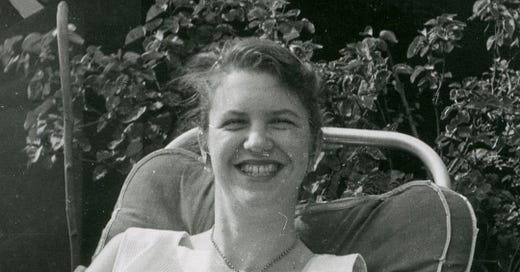Dear Plathians,
This newsletter shares a name with my forthcoming book, but I intend for it to be the place I can say all the wild things about Plath and the snarky things about Hughes that would never make it past an editor. Back in August of 2019, on the day I was offered a contract for LOVING SYLVIA PLATH (which I am in the process of finishing), my editor said to me, It has to be perfect. Because everybody is going to come for it. I knew she was right, and I knew what she meant. Books about Plath— especially books about Plath by Outspoken Feminists— are weighted with more baggage than Plath getting off the train to Cambridge with her gleaming set of white and gold Samsonite suitcases, in 1955. Folks have been all “HOW DARE SHE” about Sylvia’s work since the Kennedy administration so it’s no surprise women writing about Plath often get the same response. Janet Malcolm, writing about people who were writing about Plath in her book The Silent Woman put Plath biographies and Plath biographers into two simplified categories: good and bad. You are good if you set to typing up the facts with the objectivity of a court stenographer; you are bad if you admit to even the barest fondness for your subject, Sylvia Plath.
My book— and this newsletter— were born out of a flat out rejection of Miss-Janet-If-You’re-Nasty’s thesis. I love Sylvia Plath and I plan to continue howling that love from my suburban rooftop until my lungs give out.
In other words, I’m a bad biographer. The worst.
Everything I write about Plath, I write in opposition to the way I was taught to read her, hear her, and speak of her, which is to say, the way I was taught to read, her, and speak of all women writers, if not of all women. Plath is the most extreme case of a condition all women writers suffer from in some form— their lives and work are symbols, myths, cautionary tales. They sink beneath the weight of Yes, but, if they are still read and discussed at all. For years, I either lied outright or apologized for the truth if I was asked who my favorite writer was. I tried other writers on and out— I had a weird Henry Miller phase that involved really bad blond bangs and repeatedly telling anyone who would listen, “OMG that one line in Tropic of Cancer? When he’s dating the Russian princess, and he’s like, ‘I’m still seeing the Russian princess. She’s really a princess. But she’s got the clap. HA!’” to try and prove I was a true bohemian (or a true ex-pat misogynist?) at heart. But, to quote Plath’s buddy Anne Sexton, At night, alone, I marry the bed… Or rather, at night, alone, I read Sylvia Plath until my eyes closed. Those poems burned themselves into my brain.
And Plath’s life story burned itself onto my heart. At every turn, I felt I understood her, whether it was as a doted upon, overly performative and precocious child (at the age of 3, my aunties would parade me in front of houseguests and make me read the newspaper aloud; at the age of 6, I played Bela Bartok on our wonky piano for the same); an earnest literary teen who wrote prize-winning stories but not-so-secretly wanted to make out with the hot people (in high school I vacillated between publishing poems in the New York Times and collecting good-looking men and women to kiss at Mardi Gras); or, finally, escaping an abusive relationship with my self barely intact, a single mother rebuilding my life and writing poems with my love for my son as my guide.
Yet again at every turn, there was a book or an article telling me that there was no way I could possibly understand Sylvia. She was a mystic; enigmatic; her poems and her life were an apotheosis. I was a feminist, and this complicated things, because according to the select folks who knew Sylvia and were allowed to speak publicly about her, Sylvia was decidedly not a feminist. Ergo, this logic went, feminists speaking on or about Plath were somehow doing her dirty. If you believed in the social, economic, and political equality of the sexes, then your brain turned to warm bread pudding when you read the work of a woman who managed to get a Fulbright to Cambridge University during the Eisenhower years.
It’s no wonder, then, that when I said Sylvia Plath was my favorite writer, I felt wrong. Ashamed. As though I was trespassing, a stranger in a strange land. Who did I think I was, anyway, eavesdropping on the life of this mystic? I was just a broke American girl from the suburbs.
But, so was Sylvia Plath.
Could mystics wear bobby sox? Can you solve the mystery of someone’s life or death? Should you try? CAN FEMINISTS THINK THOUGHTS LIKE THESE? ARE THEY ALLOWED TO??
These were just some of the ideas that led me to write LOVING SYLVIA PLATH, and that I’ll explore in this newsletter. I hope you’ll stick around.
Your Own,
Emily
Up Next: Epiphany, or, Does Anyone Really Believe Ted Hughes Almost Bought A Fox Cub on the Chalk Farm Bridge in 1961 London?





Emily, I love everything about this. I, too, learned not to say that my favorite poets were Sylvia Plath & Anne Sexton. People acted like I was an embarrassment or a cliche. It's entirely dismissive of their genius & it carries forward the "thou shalt not" write confessional poetry warnings that seem only to apply to female writers. I'm so excited for your book & this newsletter. You. Kick. Ass.
Great fire here professor smarty.